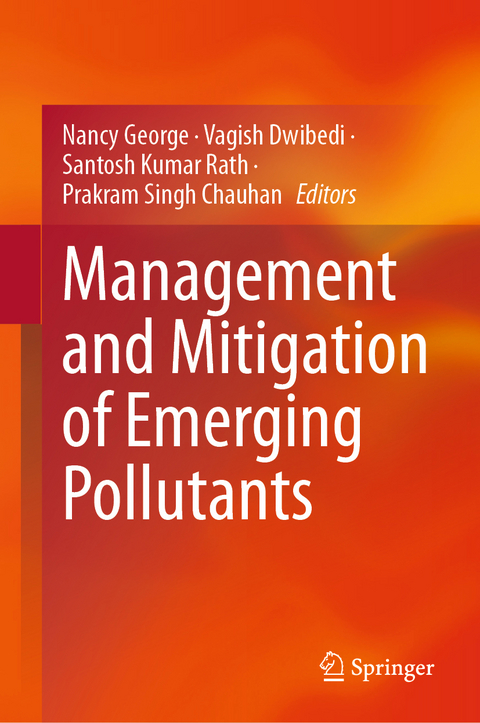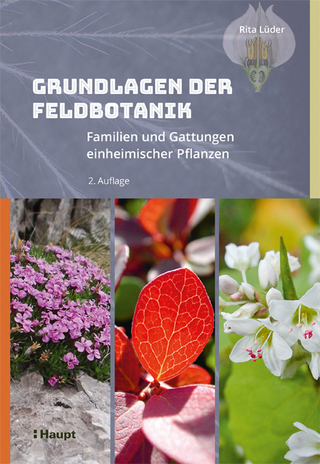
Management and Mitigation of Emerging Pollutants
Springer International Publishing (Verlag)
978-3-031-41004-8 (ISBN)
This book offers a comprehensive overview of the environmental challenges posed by emerging pollutants and the innovative strategies available for their management. Divided into 16 chapters, the book begins with an introduction to the origin and management of both inorganic and organic contaminants, offering a detailed examination of their sources and the potential risks they pose to ecosystems. It also explores current regulations and management practices aimed at mitigating their impact. In the following chapters, experts in the field cover topics such as conventional wastewater treatment methods for the removal of emerging pollutants, biotechnology-based strategies for the removal of emerging contaminants, microbial electro-deionization technologies, and algae-based bioremediation. Particular attention is given to specific remediation techniques, including phytomediated approaches, microbial fuel cells, and the novel application of microbial endophytes. Furthermore, the book explores the potential of nano-bioremediation and enzyme immobilization technologies, shedding light on their mechanism of interaction with nanomaterials and microbes for efficient treatment. Other chapters highlight the role of graphene-based nanocomposites, bio-based porous materials, and biosurfactants in the remediation of emerging pollutants, showcasing their unique capabilities and potential applications. In the final chapter of the book, readers will discover more about the impacts of emerging pollutants on environmental microbial communities and the consequential public health concerns that arise from their presence.
Given its breadth, this book is a valuable resource for environmental scientists, policymakers, and industry professionals seeking to mitigate the ecological risks associated with these contaminants.
lt;p>Dr. Nancy George is an academician and researcher with more than 15 years of experience in the field of biotechnology. She received her doctoral degree in Microbiology from the Panjab University, Chandigarh, India. She is presently working as Associate Professor at Chandigarh University, Punjab, India and is involved in research work focussed mainly on environmental biotechnology and applied microbiology. She is a life member of numerous scientific/professional societies including American society for Microbiology (ASM), Association of Microbiologists of India (AMI). Dr. George has received a senior research fellowship from CSIR, India and has numerous publications in various high impact journals of international repute with total citations of more than 350. Her research work is directed towards agricultural waste management, waste valorization and development of value added products from waste. She is also interested in remediation of microplastics and other emerging contaminants from the environment. Her current research projects include synthesis of nanoparticles from agro-waste for applications in environment remediation and degradation of emerging pollutants in aquatic environments.
Dr. Vagish Dwibedi did his B.Sc from Lucknow University, Lucknow, Uttar Pradesh, and Ph.D. from Thapar Institute of Engineering and Technology, Patiala, India. Dr. Dwibedi is an academician and researcher with more than 8 years of experience in biotech research and development. He has carried out research projects and consultancy work in the areas of plant-microbe interaction/ bioassay-guided drug-discovery and development, food security/sustainable agriculture and waste water treatment. Presently he is working as Assistant Professor at University Institute of Biotechnology , Chandigarh University, Gharuan Mohali, Punjab. Formerly, he was worked as Research Scientist at Agpharm Bioinnovations LLP incubated at Thapar Institute of Engineering & Technology, Patiala, India. He was also Winner in Down select competition- DST- Lockheed Martin- Tata Trust _IIGP 2.0 (2k18) (India Innovation Growth Programme 2.0) Innovation ID: IIGPUIBSUNB (The award carries financial support up to 11 Lac INR.). Dr. Dwibedi work is directed towards the development of screening platforms for different biological activities such as anti-microbial, anti-oxidant, anti-cancer, or finding novel molecules that interfere in the mechanism of development of diseases such as Alzheimer Dementia (AD), Parkinson disease (PD), Obesity, Anti-gout (arthritis) and type 2 diabetes. He is also interested in food security, which predominantly involves the exploitation of plant-microbe interaction to combat abiotic stress and post-harvest preservation to enhance the shelf life of fresh crop/horticulture produces. He has published more than 15 research papers in various national and international journals and published 1 Indian patent.
Dr. Santosh Kumar Rath is a medicinal and natural product chemist with more than 10 years of experience in research, academia, and industry. Dr. Rath received his doctorate from AcSIR at CSIR-Institute of Minerals and Materials Technology (CSIR-IMMT), Bhubaneswar, India. Presently he is working as Assistant Professor at Department of SoPPHI, Faculty of Pharmacy, DIT University, Dehradun, Uttarakhand, India. Formerly, he worked as an Associate Professor and Research Head at the Department of Pharmaceutical Chemistry, Danteshwari College of Pharmacy, Jagdalpur, Chhattisgarh, India. He also worked as Research Associate (CSIR-RA) in the School of Chemistry & Biochemistry at Thapar Institute of Engineering & Technology, Patiala, India. Dr. Rtah has received Research Associateship from CSIR and Senior Research Fellowship (ICMR-SRF) from ICMR, New Delhi India. He did research at CSIR-Indian Institute of Integrative Medicine (CSIR-IIIM), Jammu, India. Dr. Rath has many publications to his credit, published more than 25
Emerging Pollutants in the Environment and Ecological Risks.- Origin and Management of Inorganic and Organic Contaminants.- Conventional Wastewater Treatment Methods for the Removal of Emerging Pollutants.- Biotechnology Based Strategies for Removal of Emerging Contaminants.- Microbial Electro-Deionization Technologies for Emerging Pollutants.- Algae-Based Bioremediation of Emerging Pollutants.- Phytomediated Approach for Management of Emerging Pollutants.- Microbial Fuel Cell as an Approach for Bioremediation of Emerging Contaminants.- Microbial Endophytes: A Novel Approach for Emerging Pollutants.- Nano-Bioremediation: An Emerging Weapon for Emerging Pollutants.- Mechanism of Interaction of Nanomaterial and Microbes to Treat Emerging Pollutants.- Enzyme Immobilization Technology to Treat Emerging Pollutants.- Graphene-Based Nanocomposites for Emerging Pollutants.- Bio-Based Porous Materials for Remediation of Pollutants.- Role of Biosurfactants in the Remediation of Emerging Pollutants.- Impacts of Emerging Pollutants on Environmental Microbial Communities and their Consequent Public Health Concerns.
| Erscheinungsdatum | 10.11.2023 |
|---|---|
| Zusatzinfo | XVIII, 446 p. 101 illus., 83 illus. in color. |
| Verlagsort | Cham |
| Sprache | englisch |
| Maße | 155 x 235 mm |
| Gewicht | 853 g |
| Themenwelt | Sachbuch/Ratgeber ► Natur / Technik ► Natur / Ökologie |
| Naturwissenschaften ► Chemie | |
| Schlagworte | Advanced oxidation processes • Algae-based bioremediation • Emerging Pollutants • Graphene-based nanocomposites for pollutant remediation • Inorganic Contaminants • Microbial endophytes for bio remediation of pollutants • organic contaminants • photocatalysis • Pollution management • Pollution Remediation • technologies for removal of emerging contaminants |
| ISBN-10 | 3-031-41004-1 / 3031410041 |
| ISBN-13 | 978-3-031-41004-8 / 9783031410048 |
| Zustand | Neuware |
| Informationen gemäß Produktsicherheitsverordnung (GPSR) | |
| Haben Sie eine Frage zum Produkt? |
aus dem Bereich


